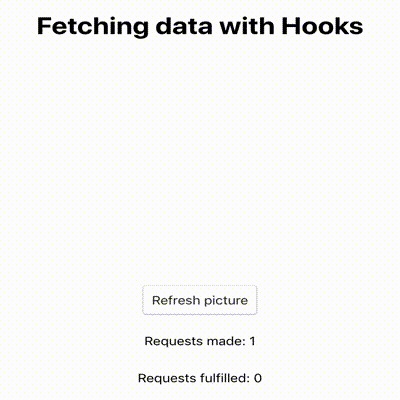- Published on
Fetching data with React Hooks
I'm teaching an intro to React workshop on the CUNY hackathon on Friday 10/18, and I've been working on some demo code, which includes a simple component showcasing data fetching with hooks.

Hooks came out in React v16.8 last February. Hooks let you use state and other React features without writing a class. Check out the React blog's Introducing Hooks post for more details.
useState allows you to add stateful variables to a function component, and useEffect combines the class-based componentDidMount and componentDidUpdate lifecycles into one: it executes code after initial render and every update (only if variables in its dependency array update, but more on that later). useEffect also plays nice with async functions - yay for data fetching!
Here's the demo code (only 50 lines!):
import React, { useState, useEffect, createRef } from 'react'
import './Fetch.css'
/** Fetch random pictures of dogs. */
const Fetch = () => {
const [isLoading, setIsLoading] = useState(true)
const [requestsFulfilled, setRequestsFulfilled] = useState(0)
const [requestsTotal, setRequestsTotal] = useState(1)
const [url, setUrl] = useState('')
useEffect(() => {
const fetchPicture = () =>
fetch(`https://dog.ceo/api/breeds/image/random`)
.then((response) => response.json())
.then((json) => void setUrl(json.message))
fetchPicture()
}, [requestsTotal])
return (
<div className="Container">
<h1>Fetching data with Hooks</h1>
<img
alt={'A random dog'}
className={`Image ${isLoading ? 'Hidden' : ''}`}
onLoad={() => {
setIsLoading(false)
setRequestsFulfilled(requestsFulfilled + 1)
}}
src={url}
/>
<button
className="Button"
onClick={() => {
setRequestsTotal(requestsTotal + 1)
setIsLoading(true)
}}
>
Refresh picture
</button>
<p>Requests made: {requestsTotal}</p>
<p>Requests fulfilled: {requestsFulfilled}</p>
</div>
)
}
And the CSS for reference
img {
height: 100%;
}
.Container {
align-items: center;
display: flex;
flex-direction: column;
min-width: 600px;
min-height: 600px;
}
.Image {
height: 300px;
opacity: 1;
transition: visibility 0.2s linear,opacity 0.2s linear;
}
.Hidden {
display: hidden;
opacity: 0;
}
Async data fetching in less than 50 lines! Fabulous!
There are four state variables:
url: persists the result of the API callrequestsTotal: number of API calls made, incremented by pressing the buttonrequestFulfilled: number of API calls fulfilledisLoading: whether there is currently a request in-flight
The magic happens in the useEffect call. This function executes after initial render and if and only if the requestsTotal variable changes, since we pass it in as a dependency to the hook. More on passing a dependency array here.
Our effect here fetches a random dog photo URL, and sets the url state variable to it. That url is used as the src of the img line 25. The onLoad handler on line 28 updates the requestFulfilled and isLoading state.
That's it! Go fetch some data!